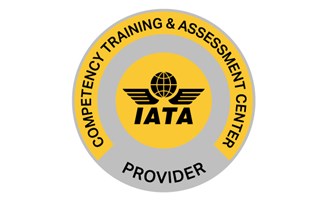Certification
Upon fulfilling the course requirements with a minimum attendance rate of 100% and demonstrating proficiency in the assessments, candidates will be awarded a
- Certificate of Completion from AAT Training Hub
- IATA Accredited certification
Dangerous goods training in Singapore plays a critical role in safeguarding public safety, protecting the environment, ensuring compliance with regulations, mitigating risks, fostering professionalism, and supporting international trade.
It is an essential component of a comprehensive approach to handling dangerous goods safely and efficiently. Join us and be trained in this subject by our experienced trainers!
Personnel responsible for preparing Dangerous Goods consignments
Duration: 35 hours
Fees: $1250
Funding: TGS-2022010782
Personnel responsible for preparing Dangerous Goods consignments (Lithium Batteries Only)
Duration: 9 hours
Fees: $320
Funding: TGS-2025057886
Personnel responsible for preparing Dangerous Goods consignments (Infectious Substances)
Duration: 18 hours
Fees: $600
Funding: TGS-2025057572
Personnel responsible for processing or accepting general cargo consignments
Duration: 8 hours
Fees: $300
Funding: TGS-2024049119
Personnel responsible for processing or accepting Dangerous Goods consignments (Ground Handling)
Duration: 24 hours
Fees: $960
Funding: TGS-2024046861
Personnel responsible for handling cargo in warehouses, loading/unloading ULDs and aircraft holds
Duration: 7 hours
Fees: $380
Funding: Not Available
Personnel responsible for check-in, baggage handling, boarding area management, and passenger contact
Duration: 5hours
Fees: $250
Funding: Not Available
Personnel responsible for screening passengers, crew, baggage, cargo, and mail
Duration: 8 hours
Fees: $300
Funding: Not Available
Safety and Security: Dangerous goods, such as hazardous chemicals, flammable substances, and explosives, pose significant risks if mishandled or improperly transported. Competent training ensures that individuals involved in handling, storing, or transporting dangerous goods are aware of the potential hazards and understand the necessary safety precautions. This helps prevent accidents, spills, leaks, and other incidents that could endanger people, property, and the environment.
Compliance with Regulations: Singapore has strict regulations in place for the handling, storage, and transportation of dangerous goods. Organizations and individuals involved in such activities are required to comply with these regulations to ensure public safety and protect the environment. Competent dangerous goods training ensures that individuals understand and comply with the relevant laws, regulations, and industry standards.
Risk Mitigation: Competent training equips individuals with the knowledge and skills needed to identify potential risks associated with dangerous goods. It helps them assess the hazards, implement appropriate risk mitigation measures, and respond effectively in case of emergencies. By mitigating risks, training helps minimize the likelihood of accidents and their potential consequences.
Professionalism and Accountability: Competent dangerous goods training enhances professionalism within the industry. It ensures that individuals involved in handling dangerous goods possess the necessary expertise and are accountable for their actions. Training programs provide comprehensive knowledge on the classification, packaging, labeling, and documentation requirements for dangerous goods, fostering responsible practices and reducing the likelihood of errors or non-compliance.
International Trade and Reputation: Singapore is a major hub for international trade and logistics. Competent dangerous goods training is vital for companies involved in import, export, and transit activities, as it enables them to comply with international standards and requirements. By demonstrating a commitment to safety and adherence to global best practices, Singapore enhances its reputation as a reliable and responsible trading partner.
IATA DANGEROUS GOODS BASIC COURSE CBTA 7.1 (Previously Cat 1, 2, 3 & 6)
IATA DGR CBTA 7.1 Recurrent ( previously IATA DGR Recurrent 1,2,3 and 6)
IATA DANGEROUS GOODS REGULATIONS BASIC RECURRENT CBTA 7.2 (Previously Category 4 ,5)




Upon fulfilling the course requirements with a minimum attendance rate of 100% and demonstrating proficiency in the assessments, candidates will be awarded a
Upon successful completion of the course, you will receive
You can:
| Functions as defined in IATA’s ‘Dangerous Goods Training Guidance’ | Functions | Previously covered under categories | Corresponding course |
| Preparing Dangerous Goods Consignments | 7.1 | 1, 2 | Dangerous Goods Regulations (DGR) for Preparing DG Consignments – Initial |
| Dangerous Goods Regulations (DGR) for Preparing DG Consignments – Recurrent | |||
| Processing or Accepting Goods Presented as General Cargo | 7.2 | 4, 7 | Dangerous Goods Regulations (DGR) for General Cargo Accepting and Processing Personnel |
| Accepting Dangerous Goods Consignments | 7.3 | 6 | Dangerous Goods Regulations (DGR) for Accepting DG Consignments – Initial |
| Dangerous Goods Regulations (DGR) for Accepting DG Consignments – Recurrent | |||
| Processing Dangerous Goods Consignments | 7.3 | 3 | Dangerous Goods Regulations (DGR) for Processing DG Consignments – Initial |
| Dangerous Goods Regulations (DGR) for Processing DG Consignments – Recurrent | |||
| Handling/loading/unloading Cargo at warehouse/aircraft | 7.4 | 5, 8 | Dangerous Goods Regulations (DGR) for Handling and Loading Personnel |
| Accepting Passenger and Crew Baggage and Direct Passenger Contact at an Airport | 7.5 | 9 | Dangerous Goods Regulations (DGR) for Passenger Handling Personnel |
| Planning of Aircraft Loading | 7.6 | 10 | Dangerous Goods Regulations (DGR) for Loadmasters and Load Planners |
| Flight Crew | 7.7 | 10 | Dangerous Goods Regulations (DGR) for Flight Crew Members |
| Flight Operations Officers and Flight Dispatchers | 7.8 | 10 | Dangerous Goods Regulations (DGR) for Flight Operations Personnel and Flight Dispatchers |
| Cabin Crew | 7.9 | 11 | Dangerous Goods Regulations (DGR) for Cabin Crew Members |
| Screening of Passengers and Crew and their Baggage, Cargo and Mail | 7.10 | 12 | Dangerous Goods Regulations (DGR) for Security Screening Personnel |

| Start Date | End Date | Time | Location | Language | Register |
|---|---|---|---|---|---|
|
02-Mar
Monday |
06-Mar
Friday |
09:00 to 17:30 | English |
|
|
|
06-Apr
Monday |
10-Apr
Friday |
09:00 to 17:30 | English |
|
|
|
04-May
Monday |
08-May
Friday |
09:00 to 17:30 | English |
|
|
|
06-Jul
Monday |
10-Jul
Friday |
09:00 to 17:30 | English |
|
"The course is well-structured and conducted by experienced trainers."
"Trainers were very supportive, I passed my certification smoothly."
"Great hands-on practice with the IATA DANGEROUS GOODS BASIC COURSE FUNCTION 7.1. Highly recommend."